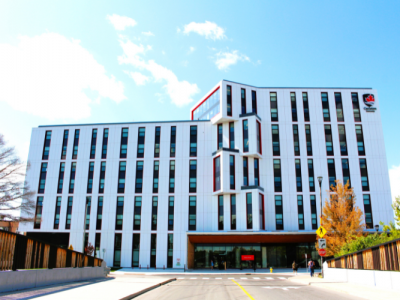Seven Carleton University researchers have received Engage Grants from the Natural Sciences and Engineering Research Council of Canada (NSERC). The funding will support research on a range of subjects including wearable smart devices, snow science and unmanned aerial vehicles (UAV), data encryption, virtual reality, manufacturing, edge computing and turbines.
The grants give Canadian companies access to knowledge, expertise and capabilities at Canadian universities and colleges. These grants foster new research partnerships by supporting short-term research and development projects aimed at addressing a company-specific problem.
“This funding from NSERC allows innovative private–sector partnerships that are a recognition of the excellence of Carleton’s research,” said Rafik Goubran, vice-president (Research and International). “These vital industry partnerships provide real societal impacts with solutions to real-world challenges.”
Prosenjit Bose, professor in the School of Computer Science, is working with Kinaxis to improve manufacturing analytics.
Supply chains like those managed by Kinaxis software identify and encode the order in which components are needed by businesses. For example, before one can put the roof on a house, the foundation must be laid. Supply chains must also be able to identify components that can be accomplished concurrently, such as painting the walls in several rooms at the same time. This project will increase the efficiency of supply chains by identifying all components that can be completed at the same time.
Changcheng Huang, professor in Systems and Computer Engineering, is working with BitQubic Corp. to create an expandable and reliable edge-computing platform. Edge computing is decentralized, where data handling moves away from a network and is placed in laptops, tablets or smartphones.
Edge computing along with 5G will bring the Internet-of-Things (IoT) and connected automated vehicles (CAVs) to everyday life. The goal is to design and implement a system that meets the requirements of edge computing while considering mobility and security constraints.
Edgar Matida, professor in Mechanical and Aerospace Engineering, is working with Bombardier Aerospace to test turbojets used for research aerial vehicles. The collaboration will help the company perform on-ground thrust measurements and emissions tests of small gas turbines. This project is possible due to collaborations with Carleton’s Mostafa El-Sayed, professor in Mechanical and Aerospace Engineering and Hamza abo el Ella, from the National Research Council.
Victoria McArthur, professor in the School of Journalism and Communication, is working with IBM to leverage data analytics to customize inclusive wearable devices.
This research project utilizes IBM Watson technology to support the mass customization of wearable devices. These smart devices can be worn as accessories or as implants. Wearable technology has a variety of applications, including health monitoring, gaming and fashion. Commercial applications for wearable technologies have been mostly limited to health monitoring or accessibility. There are still many other potential applications for wearables to improve the lives of Canadians. IBM is investigating how Watson can support mass customization of inclusive, wearable technologies to include user needs related to language, socio-economic status, culture, gender and age.
Murray Richardson, professor in Geography and Environmental Studies, is working with Arctic UAV in Iqaluit, Nunavut to improve UAV photogrammetry methods for studying Arctic tundra watersheds.
Arctic UAV Inc. provides UAV flight and image acquisition services in the Arctic, including land surveying, photogrammetry, search and rescue, site inspections and wildlife surveys. This project will develop and test snow-mapping methods using UAVs. The work leverages existing snow science activities and watershed modelling research near Iqaluit on Southern Baffin Island.
Omair Shafiq, professor in the School of Information Technology,is working with Solana Networks to improve the classification of encrypted network traffic.
With the increasing use of cybersecurity solutions, most data transmitted over networks is secured by encryption. While this is essential for the security and the protection of data, it creates challenges in performing network management and related tasks. This is especially true when large-scale data is generated at high speed and maintaining accuracy is vital. This project will use deep learning to address these challenges. Deep learning is part of machine learning and is inspired by the structures and functions of the human brain known as artificial neural networks.
Robert Teather, professor in the School of Information Technology, is working with Toonrush to examine issues of perspective and point of view in virtual reality (VR) experiences.
A major problem in VR design is controlling viewpoint; unlike traditional film where the shots presented are chosen by the director, in VR users interactively control their viewpoint and this can create barriers in storytelling. A solution may be to disable viewpoint control, but this impacts the feeling of immersion. This project investigates this impact on user experience and examines possible alternatives.
Media Contact
Steven Reid
Media Relations Officer
Carleton University
613-265-6613
Steven_Reid3@Carleton.ca
Follow us on Twitter: www.twitter.com/Cunewsroom
Monday, March 30, 2020 in News Releases
Share: Twitter, Facebook



